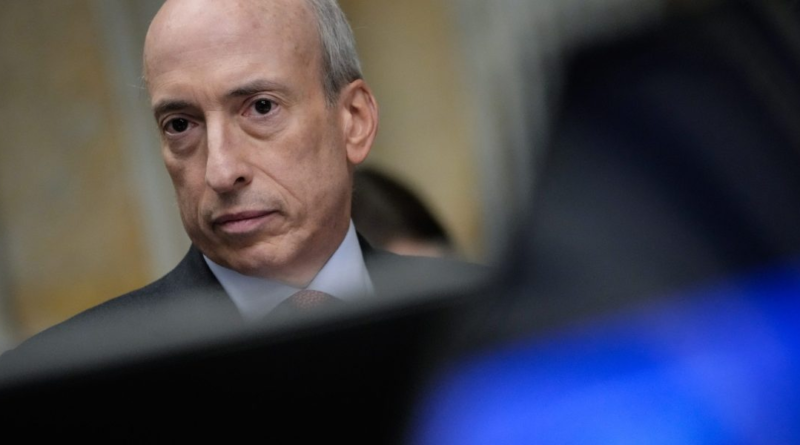BlackRock and Grayscale among 11 firms approved for spot Bitcoin ETFs in long-awaited SEC decision
After a false start on Tuesday, the Securities and Exchange Commission on Wednesday finally approved spot Bitcoin ETFs.
In a filing, the agency announced that applications for 11 issuers, including BlackRock and Grayscale, had been approved—the culmination of a process that began in 2013 when the Winklevoss twins unsuccessfully sought approval for the first Bitcoin ETF.
With the SEC approving the final forms from the issuers, trading is set to begin on Thursday.
“It’s a moment of traditional finance finally having broad-based, convenient access vehicles,” said Robert Mitchnick, head of digital assets for BlackRock, in an interview with Fortune.
Pipe dream
ETFs, or exchange-traded funds, have grown in popularity over the past two decades, providing investors access to a basket of assets such as stocks or commodities that can be traded in the form of shares on major exchanges.
A spot Bitcoin ETF, which tracks the current price of the popular cryptocurrency, had long been a pipe dream for the crypto industry, with the hope it could open new flows of investment from wealth managers and everyday traders who otherwise would not buy digital assets on exchanges like Coinbase.
Under successive administrations, the SEC rejected applications for spot Bitcoin ETFs, citing the immaturity of the market and the potential for manipulation. Even after the agency in 2021 approved a Bitcoin futures ETF, which trades derivatives on Commodity Futures Trading Commission–regulated exchanges, the SEC continued to deny applications for spot ETFs.
That dynamic changed when Grayscale, a prominent crypto asset manager that runs the largest Bitcoin trust, sued the agency in 2022 for allowing futures-based ETFs but not spot vehicles. In anticipation of a victory, BlackRock filed for a spot Bitcoin ETF in June 2023—a signal to many that approval was inevitable. After Grayscale won its case in August, the timeline was set in motion.
The past few months have been filled with speculation over when approval might come, as well as how the mechanics around such novel products would work. After a flurry of meetings between prospective issuers and the SEC in December, the agency pushed a cash model for creation and redemption of shares, meaning the onus for buying and selling Bitcoin would be on the issuers.
Finish line
Anticipating that the SEC would relent—even under the crypto-skeptical chair, Gary Gensler—the Bitcoin ETF race attracted major players from across the worlds of traditional finance and crypto. While BlackRock remains the highest-profile issuer, thanks to its existing fleet of ETF products, other approved firms include Fidelity, Franklin Templeton, and Cathie Wood’s ARK.
Crypto-native firms, hoping to entice investors by touting their experience in the digital assets space, include Grayscale, Hashdex, and Valkyrie.
The frenzy also attracted other players that aren’t issuing Bitcoin ETFs but assuming related roles. Coinbase is serving as the Bitcoin custodian for the majority of issuers, while firms such as JPMorgan, Jane Street, and Virtu are set as authorized participants—partners who sit in between issuers and investors to handle the creation and redemption of ETF shares.
Given the crowded field of entrants, which includes 11 newly approved issuers, firms have spent the past few weeks undercutting one another by offering reduced fees and waivers. Others have relied on marketing campaigns with flashy television ads and appeals to the crypto community. One issuer, the asset manager VanEck, pledged 5% of profits to the developers who maintain Bitcoin’s blockchain.
The next development to watch will be how much capital flows into the newly opened market, as well as which issuers capture the most market share. In a Twitter Spaces last week, Matthew Sigel—VanEck’s head of digital asset research—claimed that BlackRock anticipated $2 billion of capital to flow into ETFs from existing Bitcoin holders alone.
“There’s lots of hype and fascination over the approval and launch and all that, but we really think of this over a much longer time horizon,” Mitchnick told Fortune.
The decider
Onlookers had Wednesday circled on their calendar because it was the deadline for the SEC to approve the first issuer in line, ARK. Despite assurances of the date, shock waves rippled through the crypto world on Tuesday when a tweet from the SEC’s official account announced the approval of every Bitcoin ETF application. The agency quickly clarified that its account had been hacked, with the culprit still unknown.
The SEC’s approval on Wednesday came before the official close of market, prompting further fears of a false start—especially after the initial filing disappeared from its website.
This time, the green light proved real, with Gensler posting his own statement to the SEC’s website warning that the agency’s approval of the ETF is not a signal that it will approve the listings of other crypto asset securities.
Perhaps most surprising, in a 3-to-2 vote, Gensler, a Democrat, sided with the commission’s two Republicans in voting to approve the ETFs, with the two other Democrats dissenting.
“As I’ve said in the past, and without prejudging any one crypto asset, the vast majority of crypto assets are investment contracts and thus subject to the federal securities laws,” Gensler wrote, adding that the approval was not an endorsement of Bitcoin.
‘Historic milestone’
“I am happy to confirm that the Grayscale team has received necessary regulatory approvals to uplist GBTC to NYSE Arca,” Jenn Rosenthal, the firm’s VP of communications, wrote in a statement to Fortune shortly after the news broke.
“We are encouraged by the SEC’s decision and are excited to be at the forefront of providing U.S. investors a simpler means of allocating towards digital assets,” Roger Bayston, head of digital assets at Franklin Templeton, said in a statement shared with Fortune after the firm’s final prospectus had been approved.
Crypto-friendly lawmakers also celebrated the decision, including House Financial Services Committee chair Patrick McHenry (R-N.C.) and the chair of the Digital Assets Subcommittee, French Hill (R-Ark.)
“Today’s spot Bitcoin ETF approvals mark a historic milestone for the future of the digital asset ecosystem in the United States,” they wrote in a statement shared with Fortune.




